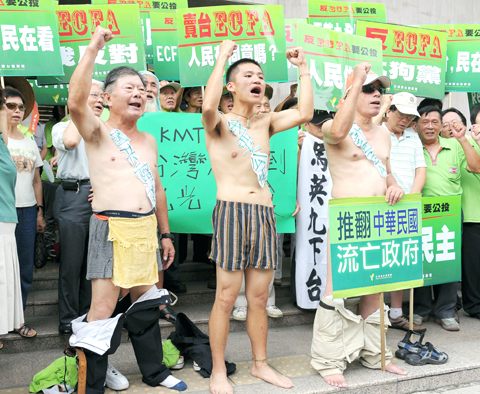The legislature yesterday ratified the cross-strait Economic Cooperation Framework Agreement (ECFA) after a showdown that saw all the Democratic Progressive Party (DPP) caucus’ motions voted down by the Chinese Nationalist Party (KMT) majority.
The vote took place after more than 10 hours of clause-by-clause deliberation, with KMT and DPP lawmakers taking the floor in turn to speak for and against the ECFA.
Yesterday was the first day of the second provisional session of the summer recess initiated by the KMT caucus to have the legislature ratify the ECFA that Taiwan signed with China on June 29.

PHOTO: CNA
Describing the ECFA as the “most important treaty” Taiwan had signed since World War II in terms of its negative impact on the nation’s sovereignty, DPP caucus whip Ker Chien-ming (柯建銘) said his caucus had done its best to warn against the agreement.
“The ECFA was a product of the KMT cooperating with the Chinese Communist Party in bringing Taiwan under the control of China economically, moving toward eventual unification,” Ker said.
The vote proceeded smoothly after the KMT caucus and President Ma Ying-jeou’s (馬英九) administration, initially having insisted on a single vote for the entire ECFA as a package, on Monday agreed to allow motions for revision of the ECFA on an individual basis.
The vote started at 9:20pm. Holding just 33 seats in the 112-seat legislature, the DPP failed in each of its 18 motions.
DPP lawmakers then shouted anti-ECFA slogans, saying the agreement was signed under the “one China” principle.
The KMT caucus, meanwhile, proceeded with its motion to vote for the accord as a whole package.
KMT Legislator Lai Shyh-bao (賴士葆) hailed the passage of the ECFA, saying its implementation would ensure the country’s economic prosperity for 50 or 60 years.
KMT Legislator Lu Shiow-yen (盧秀燕) said “China downgraded itself” to sign the accord in the name of the Association for Relations Across the Taiwan Strait, rather than its official name, in order to help boost Taiwan’s economy.
Upset with the decision, pro-independence advocates gathered outside the legislature cried foul and said the agreement would subject Taiwan to growing Chinese interference.
Holding placards and chanting anti-government slogans, around 50 activists had gathered outside the legislature hours before the vote, saying the review was flawed.
Leading the group, National Taiwan University professor Tsay Ting-kuei (蔡丁貴) said the ECFA would “strip Taiwanese people of everything and was an abuse of the people’s rights.”
To prove his point, he stripped off, along with four other activists.
Other activists climbed onto the legislature’s main gate, shouting the ECFA would leave Taiwan with no future and that it should be put to a referendum. Some painted themselves with green paint, saying that the agreement “raped Taiwan.
Although protestors verbally clashed with police at one point in the evening, no scuffles broke out between the group and police.

The US government has signed defense cooperation agreements with Japan and the Philippines to boost the deterrence capabilities of countries in the first island chain, a report by the National Security Bureau (NSB) showed. The main countries on the first island chain include the two nations and Taiwan. The bureau is to present the report at a meeting of the legislature’s Foreign Affairs and National Defense Committee tomorrow. The US military has deployed Typhon missile systems to Japan’s Yamaguchi Prefecture and Zambales province in the Philippines during their joint military exercises. It has also installed NMESIS anti-ship systems in Japan’s Okinawa

TRAGEDY STRIKES TAIPEI: The suspect died after falling off a building after he threw smoke grenades into Taipei Main Station and went on a killing spree in Zhongshan A 27-year-old suspect allegedly threw smoke grenades in Taipei Main Station and then proceeded to Zhongshan MRT Station in a random killing spree that resulted in the death of the suspect and two other civilians, and seven injured, including one in critical condition, as of press time last night. The suspect, identified as a man surnamed Chang Wen (張文), allegedly began the attack at Taipei Main Station, the Taipei Fire Department said, adding that it received a report at 5:24pm that smoke grenades had been thrown in the station. One man in his 50s was rushed to hospital after a cardiac arrest

‘WIN-WIN’: The Philippines, and central and eastern European countries are important potential drone cooperation partners, Minister of Foreign Affairs Lin Chia-lung said Minister of Foreign Affairs Lin Chia-lung (林佳龍) in an interview published yesterday confirmed that there are joint ventures between Taiwan and Poland in the drone industry. Lin made the remark in an exclusive interview with the Chinese-language Liberty Times (the Taipei Times’ sister paper). The government-backed Taiwan Excellence Drone International Business Opportunities Alliance and the Polish Chamber of Unmanned Systems on Wednesday last week signed a memorandum of understanding in Poland to develop a “non-China” supply chain for drones and work together on key technologies. Asked if Taiwan prioritized Poland among central and eastern European countries in drone collaboration, Lin

ON ALERT: Taiwan’s partners would issue warnings if China attempted to use Interpol to target Taiwanese, and the global body has mechanisms to prevent it, an official said China has stationed two to four people specializing in Taiwan affairs at its embassies in several democratic countries to monitor and harass Taiwanese, actions that the host nations would not tolerate, National Security Bureau (NSB) Director-General Tsai Ming-yen (蔡明彥) said yesterday. Tsai made the comments at a meeting of the legislature’s Foreign Affairs and National Defense Committee, which asked him and Minister of National Defense Wellington Koo (顧立雄) to report on potential conflicts in the Taiwan Strait and military preparedness. Democratic Progressive Party (DPP) Legislator Michelle Lin (林楚茵) expressed concern that Beijing has posted personnel from China’s Taiwan Affairs Office to its